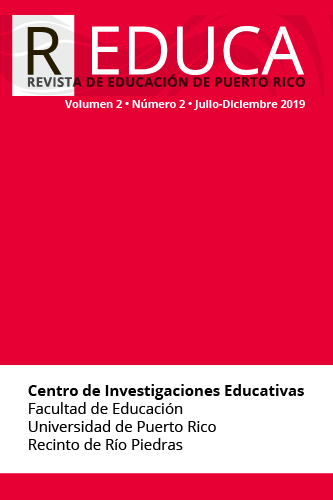Abstract
Alternative schools represent a bridge to second educational opportunities for young people who have dropped out of school. Teachers working in these schools exercise socio-educational skills since they facilitate the teaching strategies that are effective with this population. Teachers exemplify a combination of teacher-social educator role, ideal for alternative education. However, professional training does not exist for this professional. Through a survey of teachers from twelve alternative schools (n = 130) a profile was obtained. Through the descriptive method, topics and themes related to sociology, psychology and areas of socio-educational intervention are identified, for the improvement and professional development of this professional.
References
Alumnos de la Escuela Barbiana. (1986). Carta a una maestra (8va. ed.). Barcelona: Hogar del Libro.
Agencia Nacional de Evaluación de la Calidad y Acreditación (ANECA). (2005). Libro Blanco: Título de grado en Pedagogía y Educación Social (Vol. 1). Recuperado de: http://www.aneca.es/var/media/150392/libroblanco_pedagogia1_0305.pdf
Asociación Estatal de Educación Social (ASEDES) & Consejo General de Colegios de Educadoras y Educadores Sociales de España (CGCEES). (2007). Documentos profesionalizadores. Barcelona: ASEDES. Recuperado de http://www.eduso.net/archivo/docdow.php?id=143
Barrientos Soto, A. (2016). Alternative Education and the development of resilience in youth who have abandoned school in Puerto Rico. Revista de Paz y Conflictos, 9(2), 223-243. Disponible en https://www.redalyc.org/articulo.oa?id=205049851011
Barrientos Soto, A. (2018). Diseño de un plan de estudios, desde la Educación Alternativa, para el desarrollo de la profesión del educador social en Puerto Rico. (Tesis doctoral inédita). Facultad de Ciencias de la Educación, Departamento de Pedagogía, Universidad de Granada, España.
Barrientos Soto, A., González-Gijón, G. & Soriano Díaz, A. (2017). A perspective on Alternative Education in Puerto Rico: An opportunity for social and educational inclusion of students who have abandoned school. The International Journal of Humanities Education, 15(2), 17-27. Doi: http://dx.doi.org/10.18848/2327-0063/CGP/v15i02/17-27
Bisquerra Alzina, R. (Coord.). (2004). Metodología de la investigación educativa. Madrid: Editorial La Muralla.
Cámara de Representantes de Puerto Rico. (2012). Ley Habilitadora para el Desarrollo de la Educación Alternativa en Puerto Rico. Proyecto de la Cámara de Representantes 3865; Ley 213. Recuperado el 24 de junio de 2014 de: http://www.alianzaeducacionalternativa.org/iquienes-somos/ley-habilitadora-que-crea-la-aea.html
Carbonell Sebarroja, J. (2016). Pedagogías del siglo XXI: Alternativas para la innovación educativa. Barcelona: Octaedro.
Departamento de Educación del Estado Libre Asociado de Puerto Rico (DEPR). (2014). Proyecto CASA. San Juan, Puerto Rico. Recuperado el 13 de junio de 2016, de http://www.de.gobierno.pr/proyecto-casa-para-estudiantes-en-alto-riesgo
Fernández Enguita, M., Mena Martínez, L. & Riviere Gómez, J. (2010). Fracaso y abandono escolar. Colección Estudios Sociales #29. Barcelona: Fundación la Caixa.
Gutiérrez Pérez, F. & Prieto Castillo, D. (1999). La mediación pedagógica. Apuntes para una educación a distancia alternativa. Buenos Aires: Ediciones Ciccus-La Crujía.
Irizarry, R., Quintero, A. H. & Pérez Prado, Z. (2006). El joven desertor y la necesidad de un modelo educativo alternativo para su desarrollo integral: La experiencia de Nuestra Escuela. Pedagogía, 39(1), 125-149.
Kinnear, T. & Taylor, J. (1998). Investigación de mercados. Un enfoque aplicado. Santa Fe de Bogotá: McGraw-Hill.
Lange, C. & Sletten, S. (2002). Alternative Education: A brief history and research synthesis. Washington D.C.: U.S. Department of Education.
McMillan, J. H. & Schumacher, S. (2005). Investigación educativa (5ta ed.). Madrid: Pearson.
Neill, A. S. (1960). Summerhill: A radical approach to child rearing. Nueva York, NY: Hart Publishing Company.
Pardo, A. & Ruiz, M. A. (2002). SPSS 11, Guía para el análisis de datos. Madrid: McGraw-Hill.
Sliwka, A. (2012). The contribution of Alternative Education. París, Francia: Organization for Economic Cooperation and Development (OECD). Recuperado de http://www.oecd.org/edu/ceri/40805108.pdf
Silva Herrera, N. (Ed.). (2013). El perfil del estudiante: Nuevo desafío para la educación puertorriqueña. San Juan, PR: Instituto de Política Educativa para el Desarrollo Comunitario (IPEDCO), Universidad del Sagrado Corazón.
Thomson, P. & Penacchia, J. (2014). What‘s the alternative? Effective support for young people disengaging from the mainstream. Nottingham, RU: Universidad de Nottingham, Escuela de Educación.
Valenciano Canet, G. (2009). Construyendo un concepto de Educación Inclusiva: Una experiencia compartida. En M. del P. Santo Martín & M. E. Venegas Renauld, (Coords.), Aspectos claves de la Educación Inclusiva (pp. 13-24). Salamanca: Publicaciones Instituto Universitario de Integración en la Comunidad.
Zabalza, M. A. (1995). Diseño y desarrollo curricular (6ta ed.). Madrid: Narcea.
The contents published in the Puerto Rico Journal of Education is freely distributed under open access practices, in accordance with the Creative Commons license, Attribution-NonCommercial 4.0 International (CC BY-NC 4.0). Through these principles, the journal and its authors allow readers to access, reproduce and share articles in full text. Users should give credit to authors in a reasonable way without suggesting they have their support. Under no circumstances, readers may make use of the contents for commercial purposes. The authors retain copyright on their works.

